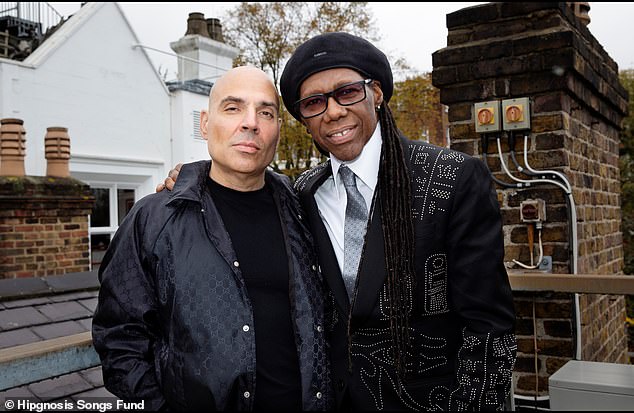- Hipgnosis said Concord had offered its investors around 93 pence per share.
- Concord’s parent company is Round Hill Music’s owner, Alchemy Copyrights.
Hipgnosis Songs Fund has agreed to a $1.4bn (£1.1bn) takeover by Concord Chorus following a tumultuous period for the listed music rights investor.
Concord’s parent company is Alchemy Copyrights and it owns Hipgnosis rival Round Hill Music, which controls the back catalogs of songwriters Stephen Sondheim and Neil Sedaka, and trip-hop band Massive Attack.
The music royalty owner told investors on Thursday that Concord will pay $1.16 (93 pence) per share, representing a 32 per cent premium to its closing share price on Wednesday.
Don’t hold back: Hipgnosis has spent more than $2 billion acquiring back catalogs from artists like Fleetwood Mac’s Christine McVie (pictured)
He said the acquisition of Hipgnosis aligned with a “long-standing goal of acquiring high-quality, long-term music assets” and would be backed by financing from private equity giant Apollo Global Management.
The transaction has received the support of 29.4 percent of Hipgnosis shareholders and is unanimously recommended by the London-listed group’s board of directors.
Hipgnosis Songs Fund Shares it soared 30.2 per cent to 91.8p just before midday on Thursday.
Hipgnosis was co-founded in 2018 by Chic guitarist Nile Rodgers and Canadian Merck Mercuriadis, who previously managed musicians including Iron Maiden, Guns ‘N’ Roses and Sir Elton John.
It has spent more than $2 billion acquiring back catalogs from artists including Shakira, Blondie, Red Hot Chili Peppers and Fleetwood Mac’s Christine McVie and Lindsay Buckingham.
The company, named after the art design group behind iconic album covers such as Pink Floyd’s Dark Side of The Moon, earns royalties every time a song to which it owns the rights is played.

Insider: Hipgnosis was co-founded by Merck Mercuriadis and Chic guitarist Nile Rodgers.
However, the value of these portfolios has declined as interest rate increases reduce the attractiveness of royalties relative to other asset classes such as bonds.
Problems intensified for Hipgnosis last October when it attempted to sell some of its music catalogs for £362m to funds advised by US investment manager Blackstone to reduce debt and finance a share buyback.
At an extraordinary general meeting, investors voted overwhelmingly against the sale and the continuation of Hipgnosis as a closed investment business.
Just before that, Hipgnosis launched a strategic review and canceled dividend payments after being informed that its royalty payments would be much lower than expected.
The group has since been at odds with its investment adviser, Hipgnosis Song Management (HSM), whose chairman is founder Merck Mercuriadis.
Robert Naylor, chairman of Hipgnosis, said Concord’s offer was an “attractive opportunity for our shareholders to immediately realize their participation at a premium, mitigating the risks we see going forward to achieve a material improvement in the share price.” .
It called on HSM to support an “orderly termination” of its advisory agreement as it would lead to higher payments and “end a period of uncertainty” for all of the company’s stakeholders.
Last month, an independent report by fund Shot Tower Capital accused HSM of failing to meet music industry standards in advising HSF, leading the group to overpay for most of its music catalogues.
It also alleged that HSM used revenue recognition policies and accrual estimates that overstated revenues and profits.
Russ Mould, investment director at AJ Bell, said: ‘Understandably, the relationship between the trust’s board and HSM is frosty, to say the least.
‘Industry analysts said it was not a question of ‘if’ but ‘when’ HSM would be fired as an investment adviser. Mercuriadis has his reputation to protect and he’s unlikely to let it go without a fight, so sit back and wait for the post-credits scene to unfold.


